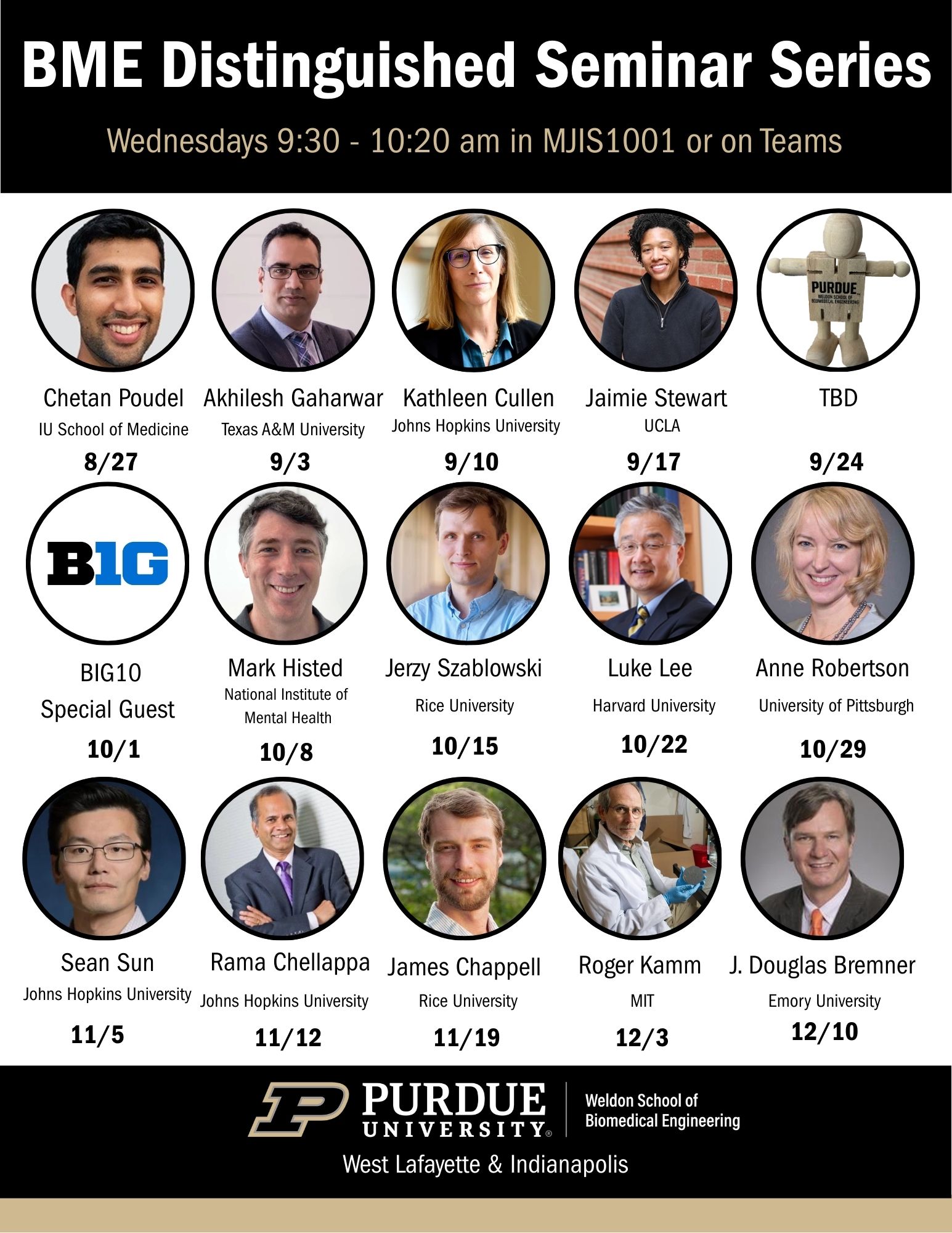Predictive Coding of Natural Self-Motion: Implications for Perception, Action and Neuroprosthetic Design, with Kathleen Cullen of Johns Hopkins University
| Event Date: | September 10, 2025 |
|---|---|
| Time: | 9:30 - 10:20 am |
| Location: | MJIS 1001 and via Teams |
| Priority: | No |
| School or Program: | Biomedical Engineering |
| College Calendar: | Show |
| Physical Address: | 206 S. Martin Jischke Drive |
Abstract: Integrating sensory with motor signals during voluntary behavior is essential for distinguishing stimuli that are a consequence of intended actions from those that are externally generated. This ability enables the brain to flexibly fine-tune motor actions based on sensory feedback, a computation necessary for subjective awareness of the effects of movements. The lecture will explore the neural circuits that perform this computation, highlighting the cerebellum's role in building predictive models of self-generated movement as individuals explore the world. Our current research addresses several key questions: How does the cerebellum learn to interpret active motion as self-generated when the relationship between actual and expected sensory feedback changes? How does the vestibular cerebellum compute the expected consequences of self-motion, adapting predictions to changes in sensory feedback statistics and implementing them flexibly across contexts? Does cerebellum-mediated vestibular reafference suppression generalize to other natural self-motion behaviors, such as standing balance and its adaptation to perturbations? In parallel, we are applying these fundamental insights to the development of next-generation vestibular prosthetics. Using non-human primate models, we are leveraging our knowledge of neural coding strategies to design more biomimetic stimulation protocols that better interface with central circuits and improve functional outcomes. These translational efforts aim to restore lost vestibular function and offer a promising avenue for enhancing sensorimotor integration in patients with bilateral vestibular loss
Biography: Kathleen Cullen is the Raj and Neera Singh Professor of Biomedical Engineering at Johns Hopkins University. She is also a Professor of Neuroscience, and Otolaryngology, and the Director of the Johns Hopkins Center for Hearing and Balance. Dr. Cullen founded and directs the Johns Hopkins’ Systems Neuroscience and Neuroengineering Laboratory (SNNL) which spans the interdisciplinary fields of neural engineering and neuroscience harnessing the power of emerging computational and neurophysiological methodologies. The overarching focus of her research program to understand how the brain creates neural representations of our motion to ensure the maintenance of balance and posture, as well as accurate perceptual stability during our everyday activities. In addition to her research activities, Dr. Cullen currently serves as the Program Chair and Vice President of the Society for the Neural Control of Movement (NCM). Dr. Cullen has long been committed to improving diversity in science, including the promotion, visibility, and representation of women and underrepresented minorities. Dr. Cullen has been an active member of the Scientific Advisory Board of the National Space Biomedical Research Institute, which works with NASA to identify health risks in extended space flight. Cullen earned a Ph.D. in Neuroscience from the University of Chicago in 1991.
~ BME Host: Maria C. Dadarlat ~
Students registered for the seminar are expected to attend in person.
Teams Meeting ID: 211 123 896 292 8 Passcode: Uh9qs2pf
MARK YOUR CALENDARS

2025-09-10 09:30:00 2025-09-10 10:20:00 America/Indiana/Indianapolis Predictive Coding of Natural Self-Motion: Implications for Perception, Action and Neuroprosthetic Design, with Kathleen Cullen of Johns Hopkins University MJIS 1001 and via Teams

